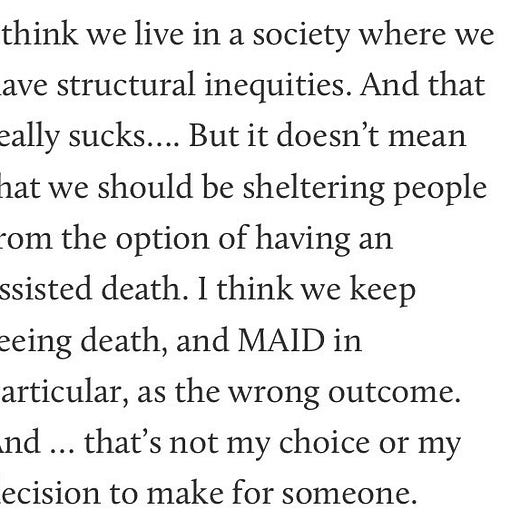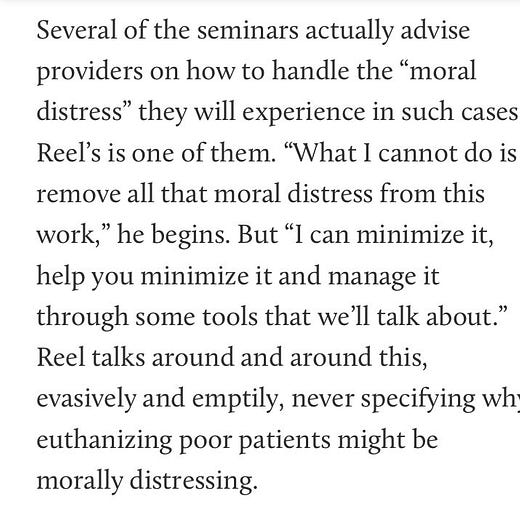Vulnerable Life at the Margins
Conversations about MAiD and leaving behind an abortion practice
I was able to be part of two good conversations recently, both of which turned on what human dignity demands at the beginning and end of life.
The first conversation was with Susannah Black and Alexander Raikin, as part of the Plough podcast. Raikin wrote an extremely carefully researched piece about Canadas’s medical euthanasia/MAiD regime for The New Atlantis.
The full audio and transcript of our conversation are available here.
One key point, from me:
We need frequent reminders of how evil this is because it’s a common human temptation. We need frequent reminders of why we don’t want to be this person. We don’t want to attach ourselves to this lineage of despising the weak, destroying the weak, claiming it’s a mercy when it’s a false mercy.
But at the same time, I don’t think we just need inoculations about reminding ourselves not to be evil. We need examples of what life with the disabled can look like, what an expansive, generous life can look like. You can look at places like the pseudo-town for dementia patients that gives them an expansive place they can move through freely and safely rather than just a locked ward.
The second conversation I got to have was with Dr. John Bruschalski, an OB-GYN who gave up abortions. He is the author of Two Patients, and I spoke with him for Public Discourse.
Bruchalski went through two conversions in how he approached medicine. He became pro-life and didn’t want to continue performing abortions. He also had a mystical experience, and received the calling to “see the poor and see them daily.” I asked him about what that meant in practice:
LS: I wanted to ask about the practicalities of living out that commitment. When a woman walks in your door who’s vulnerable, how big is the gap between the care she needs and the money available for it?
JB: Huge.
LS: Just ballparking, what percent is able to be paid for, and what percent has to come from donors?
JB: We were a for-profit medical practice. And all my bean-counter accountants were saying, “You got to stop seeing the poor.” Well, I couldn’t because that’s obedience. I believe in alms-giving because it’s very connected to medicine as mercy.
So practically, we probably raise 40 to 50 percent of the cost of our care. People sometimes ask, “Well, what was your plan, John?” I had no plan.
I have a budget now, but somehow I don’t think of it as seriously as my board does. I’m so grateful to my board for trying to keep us on the straight and narrow.
But I had dinner with Mother Angelica years ago. She was so excited about what we did before she died. She said, “Johnny, just remember, my son, budgets are for people who are fearful.” And I can tell you in my life, I’ve never been outdone in generosity.
I enjoyed both these conversations, because in both cases, my interlocutors might be briefly characterized by what they’re against, but it matters just as much to talk about what they’re for.
Abortion and MAiD are outgrowths of a society that squeezes out the vulnerable and dependent. To say “no” to either method of killing and make it stick, requires doctors to offer a more expansive “yes” to the real needs of their patients.





I think readers here will appreciate this piece by Megan Fritts on MAID in The Point Magazine. It does a good job of highlighting the abhorrent issues with Canada's program, but also honestly grapples with the deeper question that some seeking MAID may pose to its opponents: why do you want me to be in pain?
"We as a culture are excellent at ignoring suffering, in all its forms. We bury the sick and elderly alive behind the walls of nursing homes, in underfunded hospitals and overcrowded shelters. We push the vulnerable out of our line of vision by placing spikes on benches in town, building methadone clinics outside city limits and enacting zoning laws that ensure the suffering of poverty need never be seen by those who have sufficient wealth. There is, perhaps, no more human response to suffering than the urge to turn away from it, no more human response to inevitable disaster than to say, “Surely it can’t be that bad.”
https://thepointmag.com/examined-life/touch-the-man-of-grief/
I think these movements suffer from the characterization of MAID and abortion as “despising the weak” and the lack of diverse and empathetic perspectives on what policy in these areas should look like. Should a woman have to wait to go into sepsis while her fetus has a heartbeat but is slowly dying? Should a person dying of cancer endure years of unendurable pain?
When the only ‘acceptable’ position for opponents is complete bans and complete opposition, and a ‘receive an inch, take a mile’ is the endorsed political approach, there is little chance to win over public opinion.
On the one hand - as someone who opposes bans - I appreciate the honesty! But on the other hand, I think it stifles real and valuable debate. I also see little evidence of the compassionate (fully funded safety nets) approach from political actors who champion these perspectives which makes it look like a cover for a power grab (which, transparently, I fully believe it is). A lot of terrible things have been justified when opponents to a fickle movement are characterized as evil, despicable, etc.